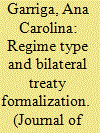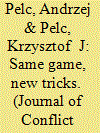|
|
|
Sort Order |
|
|
|
Items / Page
|
|
|
|
|
|
|
| Srl | Item |
| 1 |
ID:
091602


|
|
|
|
|
| Publication |
2009.
|
| Summary/Abstract |
This article builds on past framing research to probe the impact of casualty frames on the public's willingness to expend additional "blood and treasure" in an ongoing war. The rhetoric of "sunk costs" (often described as "sacrifices") that must be redeemed through further conflict is a well-known, yet irrational, trope. Utilizing an experiment embedded in a nationally representative survey on attitudes about Iraq, we find that "investment frames" increase support for the war among individuals who believe the U.S. "did the right thing in Iraq," but decrease support for the war among those who feel the U.S. "should have stayed out." We also find, however, that framing effects are inconsistent when the frames are attributed to sources. These latter results demonstrate the importance of including unattributed frames to evaluate source effects in framing research.
|
|
|
|
|
|
|
|
|
|
|
|
|
|
|
|
| 2 |
ID:
091600


|
|
|
|
|
| Publication |
2009.
|
| Summary/Abstract |
The authors' theory contributes an alternative domestic politics pathway to traditional bargaining models of war termination. In bargaining models, the rational updating process that produces an overlapping bargaining space can develop a significant lag, which extends the war beyond a logical ending point. The authors posit that a change in the domestic governing coalition is often necessary to kick-start this updating process once it has become bogged down through preference, information, and entrapment obstacles. The authors demonstrate that domestic coalition shifts are a critical path to peace, using survival analysis techniques on Bennett and Stam's (1996) war-level data set of wars (1862-1990) and a new belligerent-level data set of wars (1945-2006). These tests show that because war policies can become institutionalized over time, there is a very strong link between coalition shifts and war termination.
|
|
|
|
|
|
|
|
|
|
|
|
|
|
|
|
| 3 |
ID:
091611


|
|
|
|
|
| Publication |
2009.
|
| Summary/Abstract |
How does domestic regime type affect bilateral cooperation, and one of its most visible manifestations, bilateral treaties? This article explains how domestic political regime affects bilateral cooperation and, contrary to the expectations of some scholars, why autocracies should be expected to be more likely than democracies to enter into bilateral treaties. If the preferences of a pair of states are not identical, the sets of agreements that each party would consent to (win-sets) need to overlap for a bilateral treaty to be acceptable. Because additional domestic constraints reduce the size of a country's win-set, autocracies should have broader win-sets than democracies. Therefore, autocratic dyads should be more likely to formalize bilateral treaties than other pairs of states. Based on an original data set, I present empirical evidence showing that pairs of autocracies are more likely than other pairs of states to enter into agreements formalizing bilateral cooperation.
|
|
|
|
|
|
|
|
|
|
|
|
|
|
|
|
| 4 |
ID:
091617


|
|
|
|
|
| Publication |
2009.
|
| Summary/Abstract |
Using negative binomial models, I analyze the effects of repressive threats and procedural concessions on Zapatista protests from 1994 to 2003. Some of the results appear consistent with previous findings in the literature. Repressive threats had a negative initial effect and a positive delayed effect on protest activity and its simultaneous location across cities. However, procedural concessions had statistically insignificant negative initial and delayed effects on protests and their simultaneous location. Also contrary to the literature, when procedural concessions and repressive threats were combined, they had statistically insignificant positive initial and delayed effects on protest activity and its simultaneous location. Finally, democratization changes decreased Zapatista protests in the short and long term and helped to focus mobilization efforts on the remaining closed environments. Thus, democratization openings and an inconsistent use of repressive threats and procedural concessions did not strengthen the development of the movement; they contributed to the movement's relative weakness.
|
|
|
|
|
|
|
|
|
|
|
|
|
|
|
|
| 5 |
ID:
091616


|
|
|
|
|
| Publication |
2009.
|
| Summary/Abstract |
The aim of this article is to distinguish between strategies in the Iterated Prisoner's Dilemma on the basis of their relative performance in a given population set. We first define a natural order on such strategies that disregards isolated disturbances, by using the limit of time-average payoffs. This order allows us to consider one strategy as strictly better than another in some population of strategies. We then determine a strategy-to be ''robust,'' if in any population consisting of copies of two types of strategies, itself and some other strategy - the strategy - is never worse than. We present a large class of such robust strategies. Strikingly, robustness can accommodate an arbitrary level of generosity, conditional on the strength of subsequent retaliation; and it does not require symmetric retaliation. Taken together, these findings allow us to design strategies that significantly lessen the problem of noise, without forsaking performance. Finally, we show that no strategy exhibits robustness in all population sets of three or more strategy types.
|
|
|
|
|
|
|
|
|
|
|
|
|
|
|
|
| 6 |
ID:
091613


|
|
|
|
|
| Publication |
2009.
|
| Summary/Abstract |
A recent wave of scholarly literature has argued forcibly that the European Union's European Security and Defence Policy (ESDP) represents an attempt on the part of the EU to "balance" against the United States. According to such analyses, the EU is reacting to American global preeminence by building up its military capacities to enhance its own ability to play a significant, autonomous role in international affairs. This article takes issue with such claims. It points, first, to significant theoretical and methodological shortcomings inherent in the work of the "soft balancers." Second, and more fundamentally, it subjects this work to careful empirical scrutiny and illustrates how the soft balancers have fundamentally misunderstood ESDP. Finally, it illustrates how such misinterpretations result from a failure to appreciate the profound impact that institutional structures wield over substantive outcomes in international security affairs.
|
|
|
|
|
|
|
|
|
|
|
|
|
|
|
|
| 7 |
ID:
091614


|
|
|
|
|
| Publication |
2009.
|
| Summary/Abstract |
Why do targets sometimes make concessions when third parties offer assistance? Both the extended deterrence and alliance literatures point to unreliable third parties to explain deterrence failure and target acquiescence. On the other hand, the alliance literature also suggests that third parties present a moral-hazard situation in which targets will behave less prudently when they have outside support. Without dismissing the importance of these dynamics, I demonstrate that targets will still make concessions when intervention is certain, and that interveners do not always embolden targets in crisis situations. Counterintuitively, interveners alter the bargaining situation, shifting the bargaining space so that conceding is more attractive than war for the target state. Instead of emboldening targets, third parties deter larger demands and produce settlement outcomes that reduce the burden on the target.
|
|
|
|
|
|
|
|
|
|
|
|
|
|
|
|
|
|
|
|
|